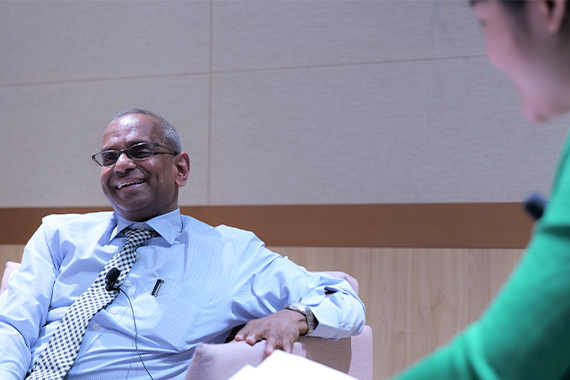Top image: Zachary Tang / RICE File Photo
Any talk about The Economy intimidates the average Singaporean. But everybody has an opinion about the economy these days, especially with the Budget 2024 statement arriving today.
Even as the regular layperson struggles to grasp the study of economics, its significance is felt in everything from the Goods and Service Tax (GST) to our stance on foreign talent.
And if anyone knows anything about the economy, it’s Manu Bhaskaran, the Vice President of the Economics Society of Singapore (ESS) and CEO of research and advisory firm Centennial Asia Advisors. On top of his Harvard and Cambridge education, the man has some 40 years of experience in the field of economics and public policy.
He understands the study of scarcity at a level few others do here, but thankfully, the man has the patience to explain it to us like we’re five. Ahead of Budget 2024, Manu dissects some common concerns our readers have raised about Singapore’s monetary policies.

Are government assistance packages (CDC vouchers, lump sum payments, etc) actually effective in reducing the impact of GST hikes?
These offsets do help the lower-income segments by alleviating some of the impact. But ultimately, it depends on how long these offsets last and what the second and third-round effects of GST will be.
I have not seen a good study of these effects. For example, a rise in GST rates often leads to some firms using that as an excuse to raise prices by more than the GST hike. Singapore does not have a strong consumer protection mechanism, so it is quite plausible that such profiteering happens. This effect is not offset by measures such as vouchers.
Are there benefits to lowering taxes in Singapore? For example, the Laffer Curve theory posits that lowering taxes may lead to high tax revenue due to increased spending.

The Laffer Curve has been discredited a long time ago. Lower taxes do bring benefits, of course—the private sector has more money left to spend on itself, and with more after-tax profits and wages, there is a greater incentive to work and produce stuff.
Lower tax rates for the wealthy also attract high-net-worth people to bring their wealth to Singapore to be managed, helping our financial sector—though how much actual benefits this brings to the average Singaporean or to Singaporean firms and workers is debatable.
However, lower taxes could also mean that there is less revenue to spend on health, education, helping the poor, and so on. So, there is always a trade-off, and the net impact really depends on us knowing the full details and numbers behind the budget.
It really depends on how the money is spent. Increased taxes mean increased revenues. So you have to consider what the revenue is spent on.
If you raise taxes on certain goods, such as alcohol or tobacco, the demand will not change very much. This is called ‘inelastic demand’. And people do trade down [with cheaper alternatives] when taxes rise on cigarettes or alcohol.
So, if you raise taxes on goods and services which have inelastic demand and spend that money on socially productive purposes like helping the elderly, then that’s a net positive.
But again, you have to take into account the various factors when you decide how much tax to charge. The positive effect plateaus eventually. For example, if you tax 95 percent of your income, that means you’re going to lose $95 every $100 you earn. That reduces the incentive to work and build wealth. It’s always a tradeoff.

While Singapore does not have a wealth tax, wealthier Singaporeans pay tax at a higher rate. Is this enough to be considered fair?
It is only fair that the wealthy pay a higher rate of tax, whether on income or on their assets. But there are a lot of issues here.
– Is a wealth tax as opposed to higher usage of the investment income the optimal way to go? In other words, do we really need to even think about wealth taxes?
– Do we tax only wealthy Singaporeans but not the wealthy foreigners who bring money into Singapore?
– How do we define ‘wealthy’? If it is only those who are worth $100 million and more, it would be okay. But if it applies to middle-class families which happen to be living in landed property worth, say, $5 million, is that fair?
– Because of the ease of shifting wealth away from the taxman, the government here has chosen an indirect way to tax wealth—that is, via higher tax on property and on luxury cars. This has hit middle-class families hard.
Speaking of the ultra-wealthy, the number of family offices in Singapore has increased. We know why family offices choose to base themselves in Singapore, but how do family offices benefit the country’s economy?
The number of family offices has soared in the past few years, a testament to the trust that the wealthy of the world place in Singapore. Under the rules, these family offices have to hire a certain number of Singapore residents and engage professional services such as lawyers, accountants and so on.

So, there is some spillover, but it does not seem to be much. The huge increase in family offices does result in demand for office space going up, so rents for the local firms will rise. It could also mean that wages are higher to some extent because of higher demand for staff, which means staff costs rise for local firms as well.
Do these local firms receive extra benefits commensurate with those increased costs? I remain to be convinced about that.
What should the average Singaporean pay attention to for Budget 2024?
– What are the revenue numbers looking like? Probably vastly higher than the government estimated last year.
– Where is the additional revenue going?
– Are there more reliefs for the average Singaporean?
– Are more taxes raised? We have already seen two successive hikes in GST, a rise in carbon taxes, etc.
– What spending items are raised and why?
– The budget statement is also a platform for the government to articulate its economic and social policies, so what are the signals being sent this year? Will there be more help for less fortunate Singaporeans, such as the elderly, the poor, and the unemployed?






